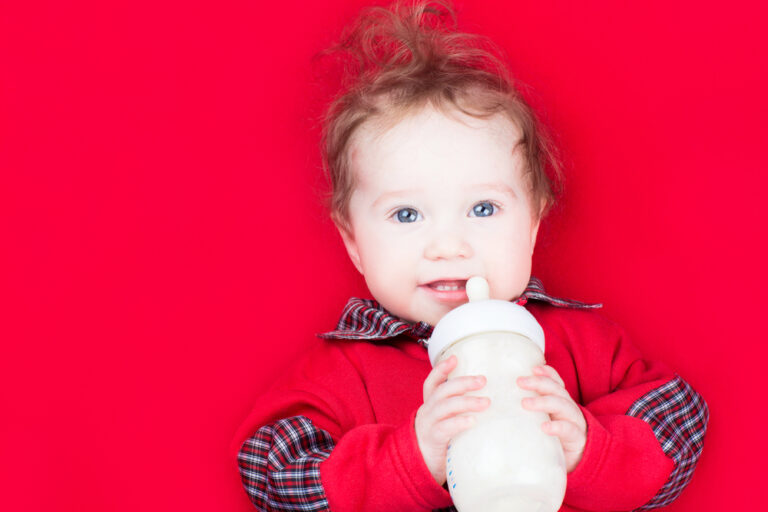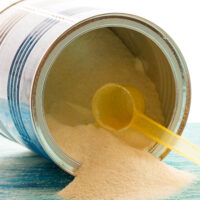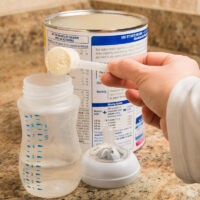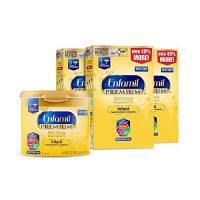Yes, warm formula does help with gas.
Mixing your baby’s formula while it’s warm helps the solids dissolve into the water more easily.
This means you won’t have to mix or shake it as much before giving it to your baby. Without the extra shaking, you don’t create as many air bubbles. You can also give the formula a chance to settle before giving it to your baby.
Below, we’ll take a closer look at other causes of gas and feeding techniques to relieve their discomfort.
Why Do Bottle-Fed Babies Get Gas?
There are many reasons babies get gas from eating.
Usually, the culprit is extra air. The easiest way to mix your baby’s formula is usually shaking since it makes the formula combine the fastest. Unfortunately, mixing also causes air bubbles that eventually end up in your baby’s digestive tract. It is also easy for babies to get air when they are drinking from a bottle.
You can decrease air by tilting the bottle so formula completely covers the nipple and by using a nipple with the right flow.
Babies can also develop gas as a side effect of a bigger issue, like a gastrointestinal problem or a cow’s milk allergy. Gas could also be the result of an allergy or intolerance to an ingredient in the formula.
Using Warm Baby Formula to Stop Gas
Mix With Warm Water
It’s also important to mix your baby’s formula properly to prevent excess air that leads to gas. While you can mix the formula and then warm your baby’s bottle, it’s more effective to start with warm water. This helps the formula solids dissolve better, so you need to mix the formula less. Less mixing means fewer air bubbles.
Stir, Don’t Shake
Something else to consider is how you are mixing the formula. Shaking the bottle is usually easier since you don’t need any extra utensils. However, shaking the mixture also puts a lot more air in it. The excess air bubbles may cause your baby gas.
Let the Formula Settle
Something else you can do after mixing the formula is to give it a chance to settle. Let the bottle sit for 1-2 minutes so the air bubbles have a chance to rise to the top of the milk, so they aren’t through the mixture.
Other Ways to Help with Gas in Babies
Something to remember is that some gas in your newborn is natural. Your baby’s digestive system is still maturing and learning what to do. This is especially true as your baby adapts to being fed outside the womb. Even so, some babies have excessive gas that may cause fussiness and discomfort.
Changing Formula
Some babies’ digestive systems are especially sensitive, so they need a formula that is gentler on their tummies. By choosing formula that works well for gassy babies, you can reduce gas after a feeding.
Gas Drops
Some parents also swear by gas drops to relieve their baby’s symptoms. They work by breaking up bubbles in your baby’s digestive tract.
Exercises and Tummy Massage
There are also a lot of exercises you can do to help relieve gas. You can gently bicycle their legs. Another exercise is pulling one of your baby’s legs up toward the elbow on the opposite side. Push their knee and elbow toward their stomach to help push gas through the digestive system.
Tummy massage might also help. Lay your baby down (wait at least 10-15 minutes after a feeding) and rub their belly. Put gentle pressure on it. You can rub in small circles or press gently. Pay attention to your baby’s reactions and do what relieves their gas pain.
Feeding and Bottle Position
Changing your baby’s bottle and feeding position might also help. Be sure your baby’s head is sitting higher than their tummy during feeding, to help reduce the amount of air they swallow. You should also be sure the bottle is tilted, so the air is at the end away from the pacifier.
Final Word
Using warm water to mix your baby’s formula is one of many ways that you can help reduce gas during feeding time.
By using warm formula at each feeding, watching bottle position, and regularly burping baby, you can help make feeding time more comfortable for you both.






